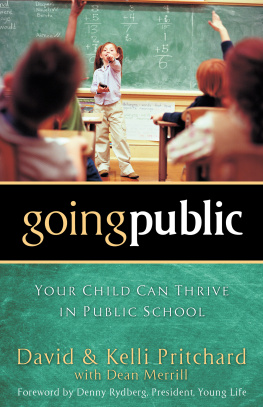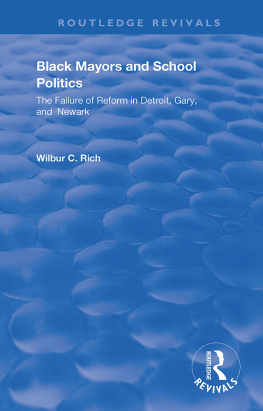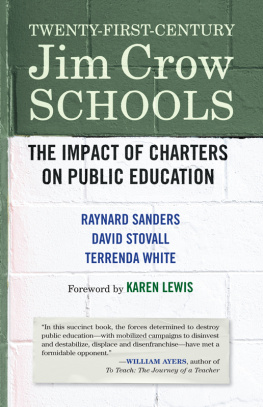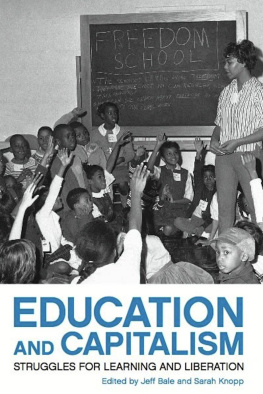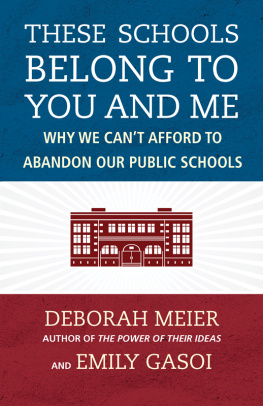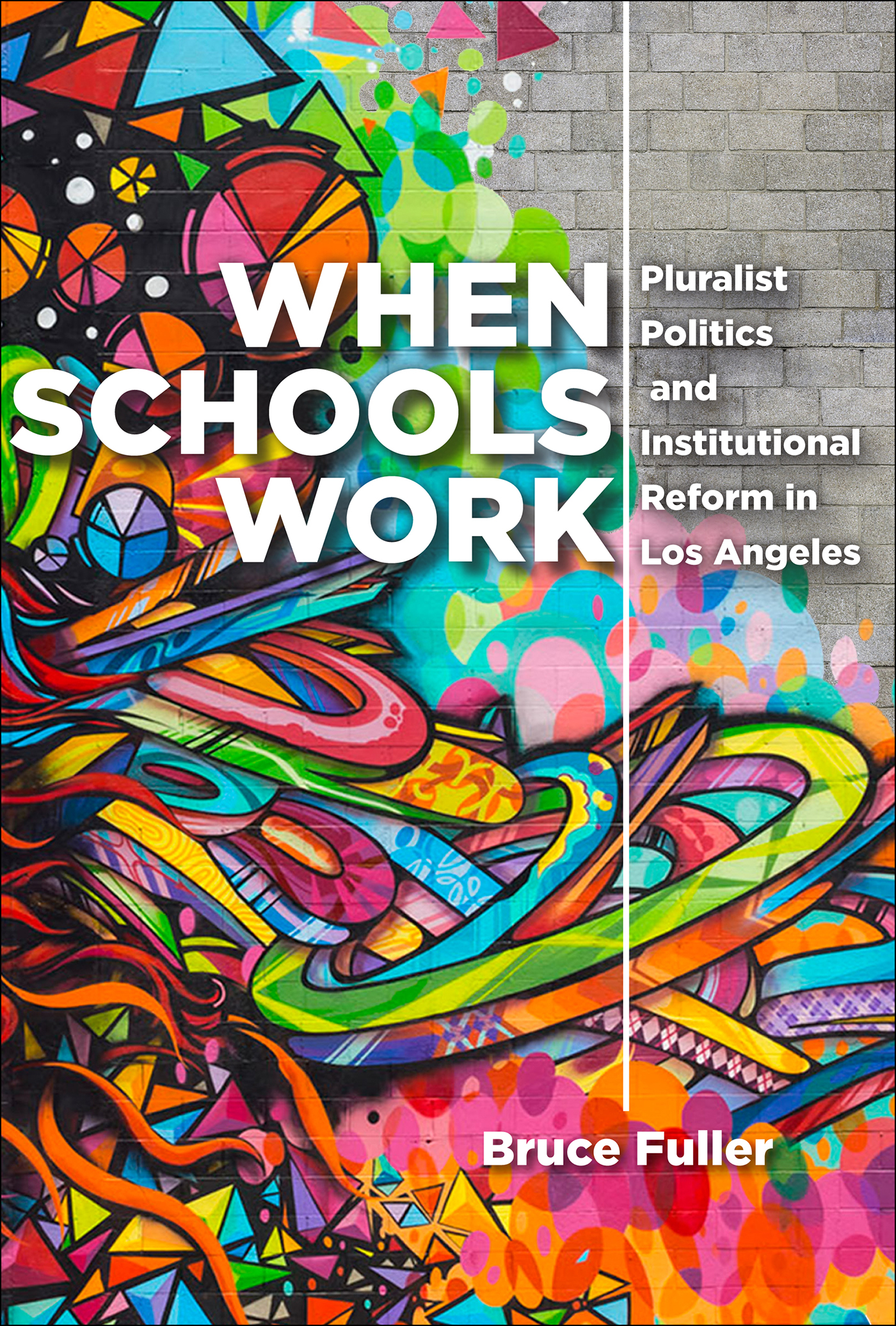When Schools Work
When Schools Work
Pluralist Politics and Institutional Reform in Los Angeles
BRUCE FULLER

Johns Hopkins University Press
Baltimore
2022 Johns Hopkins University Press
All rights reserved. Published 2022
Printed in the United States of America on acid-free paper
2 4 6 8 9 7 5 3 1
Johns Hopkins University Press
2715 North Charles Street
Baltimore, Maryland 21218-4363
www.press.jhu.edu
Library of Congress Cataloging-in-Publication Data
Names: Fuller, Bruce, author.
Title: When schools work : pluralist politics and institutional reform in Los Angeles / Bruce Fuller.
Description: Baltimore : Johns Hopkins University Press, 2022. | Includes bibliographical references and index.
Identifiers: LCCN 2021018592 | ISBN 9781421442778 (hardcover) | ISBN 9781421442785 (ebook)
Subjects: LCSH: Public schoolsCaliforniaLos Angeles. | Education and stateCaliforniaLos Angeles. | Academic achievementCaliforniaLos Angeles. | Educational changeCaliforniaLos Angeles.
Classification: LCC LA245.L6 F85 2022 | DDC 370.9794/94dc23
LC record available at https://lccn.loc.gov/2021018592
A catalog record for this book is available from the British Library.
Special discounts are available for bulk purchases of this book. For more information, please contact Special Sales at specialsales@jh.edu.
NOTES ON THE VERNACULAR
Let me clarify a few terms that appear throughout the book. I follow custom by abbreviating Los Angeles with the ubiquitous idiom, L.A. This sparse acronym began appearing in the 1870s but was not used much until the 1920s, after film and entertainment industries grew in prominence nationwide. The use of L.A. became the norm in the 1950s, as war veterans, midwesterners, and Blacks (again) flocked to a burgeoning labor market.
Latino is preferred to Latinx, except when quoting someone. Thats because only university professors and elite groups use Latinx, not the diverse array of Hispanic-heritage peoples on the ground. Just one in four Latinos surveyed in 2020 had heard the term Latinx, and just 3 percent use the term in everyday conversation.
I deploy the word tribe when referring to ethnic or social-class groups, including the white Protestant tribe. This label is defined in the Oxford English Dictionary as a social division in a traditional society consisting of families and communities linked by social, economic, religious, or blood ties, with a common culture and dialect.
When Schools Work
PROLOGUE
Pluralist Politics Move Institutions
Schools fail our kids miserably, critics claim. Dont our tax dollars, intended for classrooms, get diverted to education bureaucrats and fat teacher pensions? Then, civic leaders dodge efforts to shake up this entrenched institution, failing to purge lousy teachers and lift student learning? The skeptics respond by inflicting market competition on public organizations, portable vouchers for parents, or private-like charter schools. Meanwhile, politicians on the Left, hemmed in by union stalwarts, seem to protect anemic schools, preserving grossly unequal opportunities afforded our children.
This book challenges these naysayers on two scores, telling how a variety of activists built a feisty democratic politics, then breathed new life into a moribund institution once given up for dead: public schools in Los Angeles. A fresh generation of civic playersforming a vibrant network of civil rights litigators, Black and Latino leaders, pro-equity nonprofits, reform-minded teachers, and wealthy donorswould unite against a shared enemy by the 1990s. The foe held in common was the arcane regime that centrally regimented life in nearly one thousand schools dispersed across Southern California.
The new pluralists, as I dub them, sprouted from a kaleidoscope of racial histories and cultural identities. These youthful agitators devised a politics founded on mutual respect for one another along with shared enthusiasm for inventive policy. Most fundamentally, they distanced themselves from the old polarity marking urban politics, one that pits corporate moguls against protective labor leaders, including powerful teachers unions. Meanwhile, distant managers of the education bureaucracy, housed inside their twenty-eight-story fortress downtown, showed little concern for regressively funded schools, the steady loss of caring teachers and middle-class families, the bleeding of dropouts from dreary high schools. So, this virgin civic terrain became a proving ground for the new pluralists, as they forcefully prodded the hidebound institution of schooling in the subsequent quarter century.
Acting from various corners of the civic stage, the insurgents were animated by a set of principles, and they were united in their struggle to challenge, even subvert, the central bureaucracy. The new pluralists advocated for better teachers, for rigorous and nurturing social relations inside schools. They went to court to win progressive funding for schools in the poorest stretches of Los Angeles. They created engaging schools that mirrored the citys widening diversity, expanding racially integrated magnet schools, creating small high schools to serve immigrant neighborhoods, and, most controversially, establishing scores of charter schools run beyond the reach of education officials downtown.
The new pluralists battled a politically protected regime that had long delivered spotty results for kids and familiesschools that enforced a uniform cultural agenda and segregated children along familiar lines of race and social class. This book chronicles the rise of this counterinsurgency, a diverse array of activists who envisioned a thicker, more inclusive civil society, one that sparks evocative strategies for altering key institutions in human societies. These pluralists, speaking back to the critics, teach us about how deeply democratic politics can be fostered in the American metropolis, then how inventive policies spur institutional change.
Early in this volume, you will meet the youthful activists who premiered in the civic arena well over a generation agochallenging established interests, organizing rallies before the L.A. school board, and taking to the streets when necessary, as they saw it. These proliferating ethnic activists and nonprofits began to nurture student leaders inside high schools, along with taking their case to bipartisan mayors, reform-minded funders, and journalists. They borrowed more from Western humanism and the Latino spirit of familismo than from market-oriented neoliberalism. Yet, the new pluralists were less interested in ideological categories and more intent on creating culturally respectful and effective schools.
A moderate wing emerged among this spectrum of rabble-rousers, soon enlisting progressive lawyers, descendants of the civil rights era, to successfully move new dollars to schools serving poor families. They pushed to clarify what children should be learning, then nudged teachers to respect all students, deracializing expectations about who can aspire to enter college. These loyal insidersthe moderate pluralistsretained faith in the basic institution, the Los Angeles Unified School District. But they drew on notions of neighborhood control and liberalized options to create scores of small pilot schools, which emphasized social justice, theater arts, and high-tech curricular themes. Finding allies inside the bureaucracy, the loyal insiders expanded magnet schools and founded dual-language campuses, where L.A.s colorful groups could hear their native tongue and see their own heritage in nearby schools.


